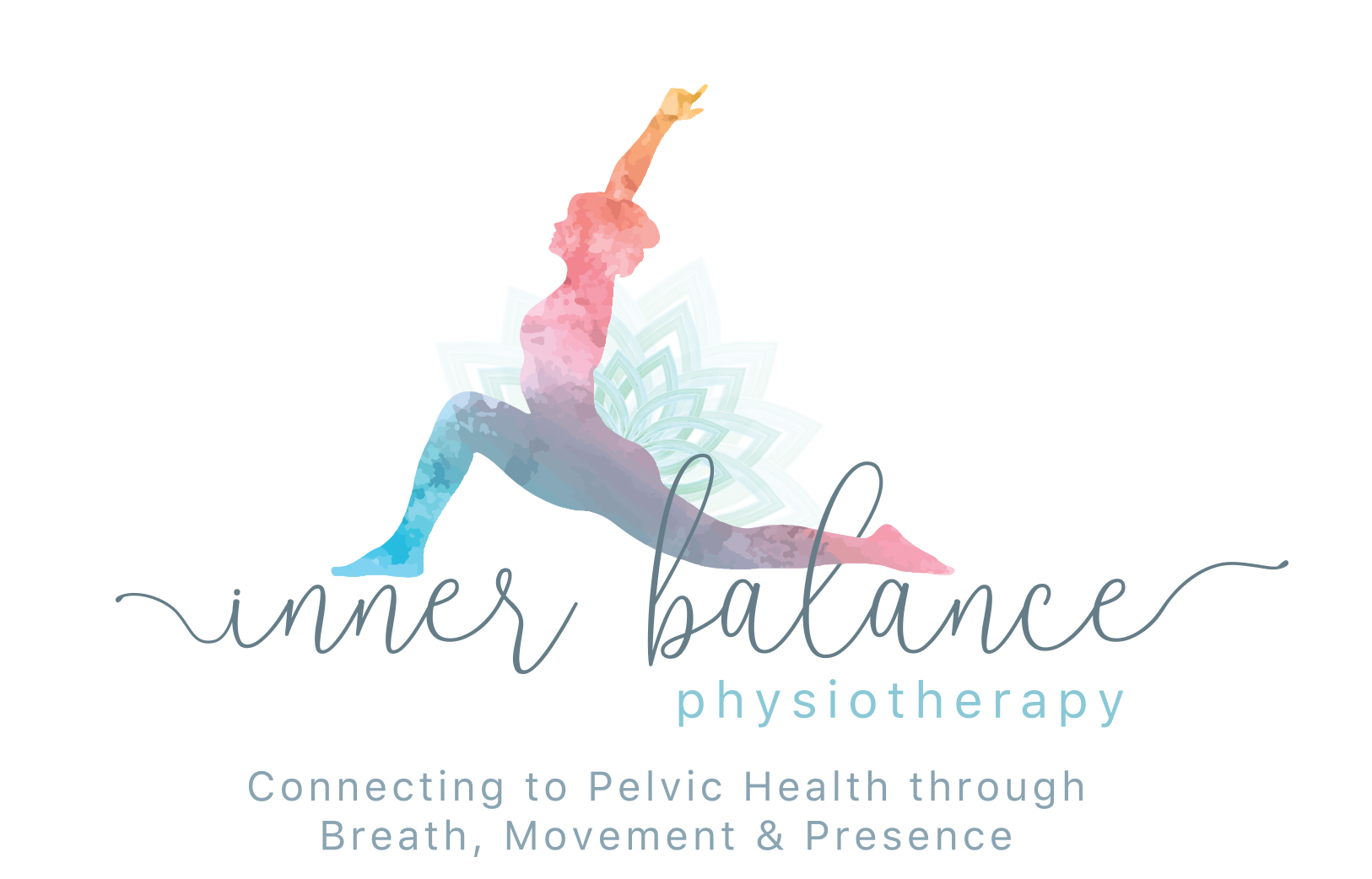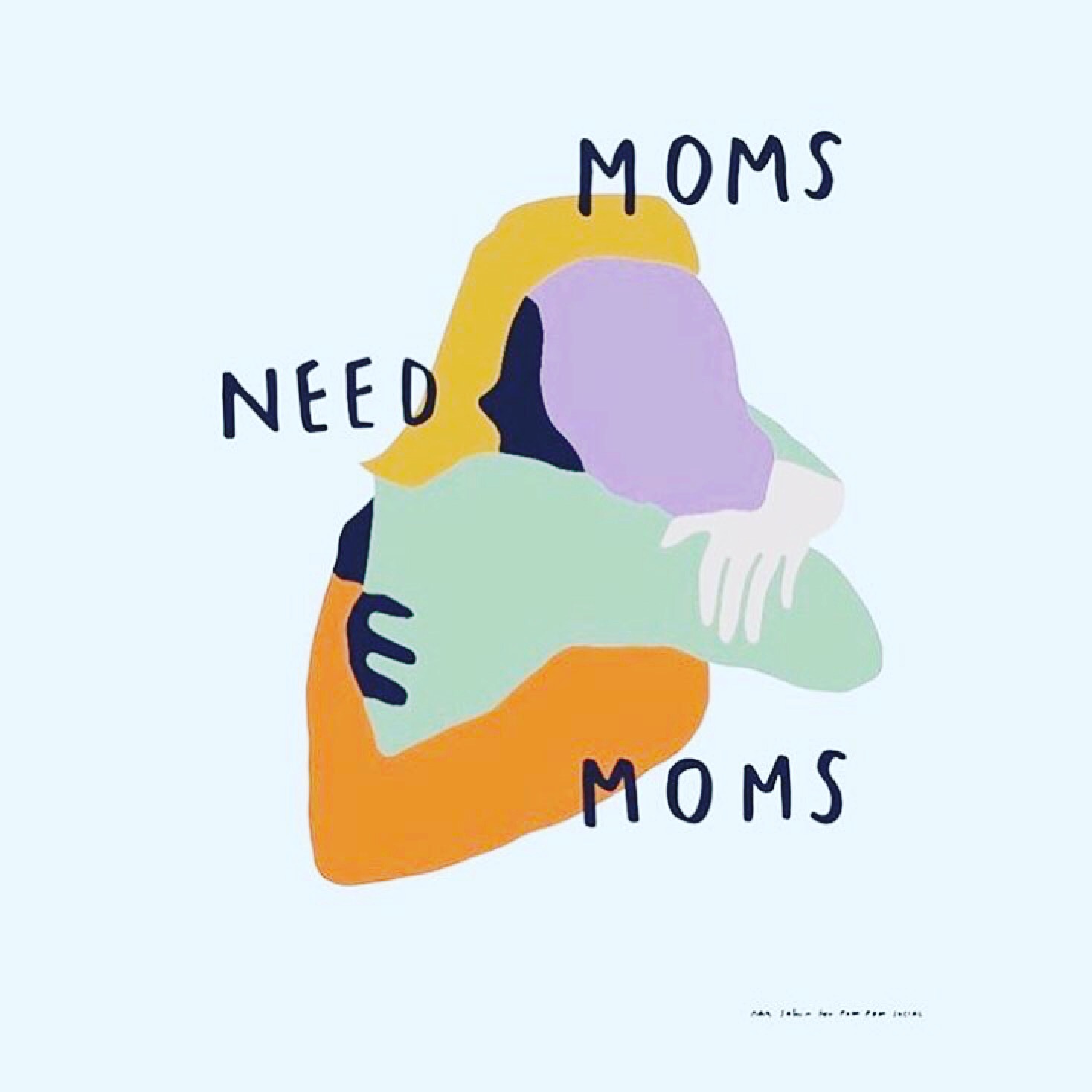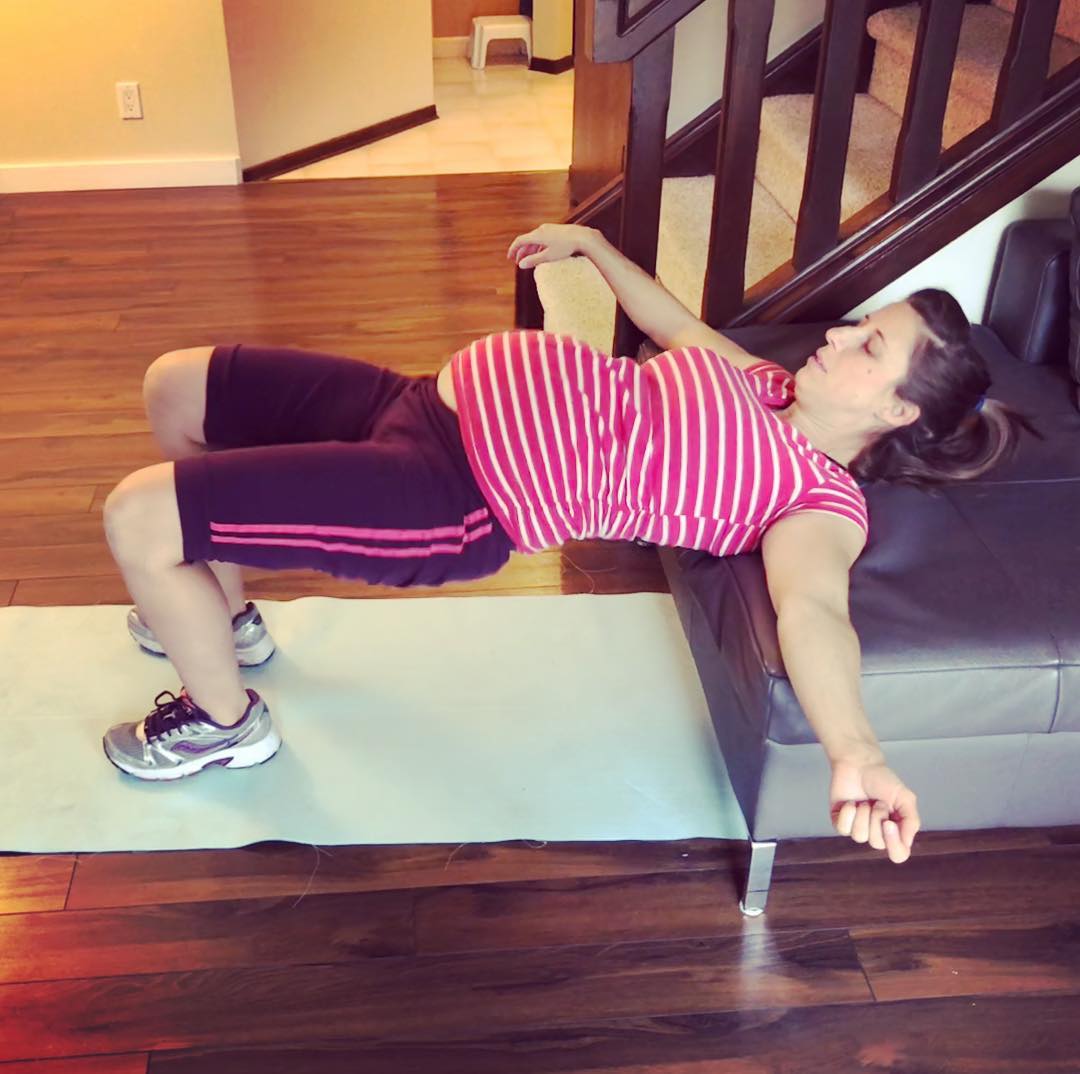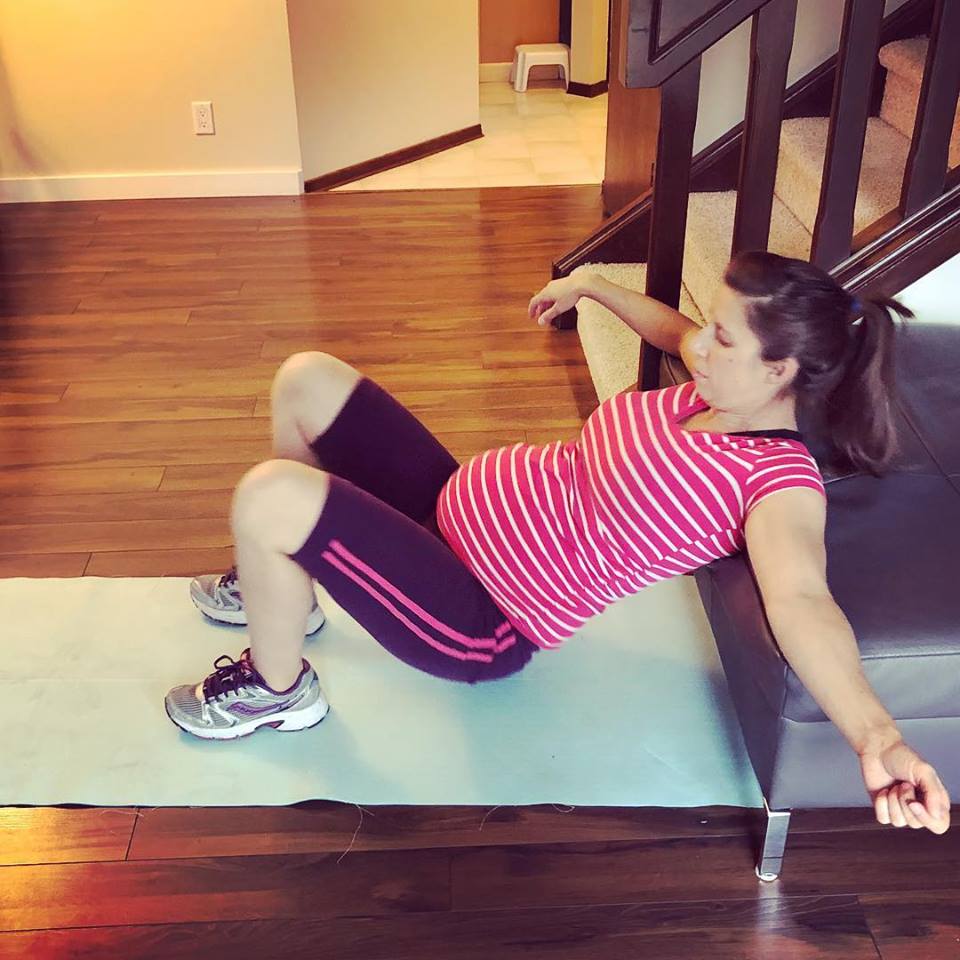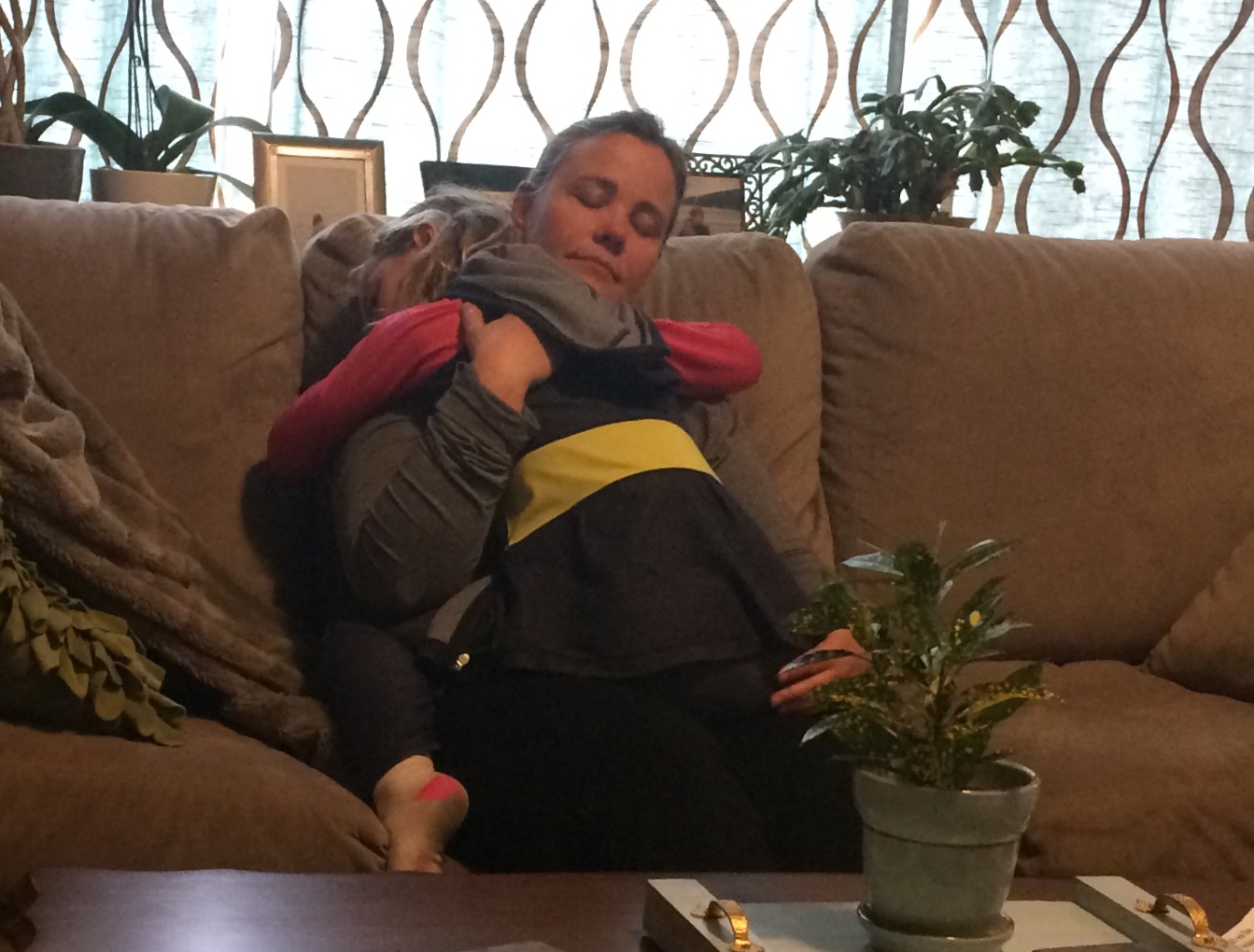
THE BARBELL BLOG
A solid resource squeezing out the facts
Be your own advocate!
When I was 20 weeks pregnant, I had intense pain in my leg. I knew something was very wrong, but my doctor dismissed me.
TBT to 11 years ago standing with my Sister in law. I had 2 weeks to go. She had 2 1/2 months.
When I was 20 weeks pregnant with my son I had a DVT, a Deep Vein Thrombosis. A blood clot in my leg. A very large blood clot.
I was walking between meetings with some colleagues and I told them I had to take a taxi because my leg hurt too much. They thought I was nuts.
I went to my doc that afternoon and she told me it was probably "just pregnancy pain". That night I couldn't sleep because of the pain. So I asked Dr. Google, and I self diagnosed a DVT.
I went back the next day and she still didn't think it was anything serious. I told her there was no way it was just "pregnancy pain" and that I was sure it was a blood clot. Because I was so adamant, she told me she would send me for an ultrasound "just to put my mind at ease."
I remember sitting in that ultrasound room and the technician came back and said "Do you have anyone here with you?" I told her I didn't. And she said "Well you need to get to the hospital now." I was admitted immediately.
My doctor made a mistake. My blood clot was extremely large and if not treated it could have been deadly. I was admitted to the hospital and my 20 week affair with needles began. (My husband had to give me daily blood thinner medication by a needle.... and I HATE needles. 🙈)
I trusted my intuition and I wouldn't leave the office until she sent me for an ultrasound. I was not one to question what a doctor has to say, but I did that day.
DVT's are not common, but they are 10 times more likely to happen during pregnancy. I knew nothing about them. We had recently been on a long car trip to visit family and a few days later I knew something wasn't right. I had intense pain and some swelling in my left leg.
If you think that something's not right... if your intuition is telling you something.... go with your gut.
Fight for what you believe. Don't let someone - even if it is a doctor - tell you it's nothing.
Ask the questions. Demand answers. If you don't think you are being treated fairly, find another medical professional.
Be your own advocate.
.
Because if you won't, who will?
Your Body Image Impacts Your Children.
You are gifting your child with a narrative about their bodies based on what you say about your own.
Choose your words and your actions carefully mommas
Your body image impacts your children.
Your body image impacts your children.
Are you a mom? Because I’m not sure if you read those last 2 sentences so I’ll repeat it one more time.
Your body image impacts your children.
Do you listen to podcasts? Well even if you don't, you NEED to listen to this one.
Balance 365 Radio. Podcast #13. How Your Body Image Impacts your Children with Hilary McBride.
Here are a couple takeaways as I’ve listened to it three times.. Seriously... this is such good stuff that EVERY mom needs to hear.
“Women are bonding putting their bodies down as a way of preserving connection.”
“Girls are learning that they need to hate their bodies in order to participate in our society.”
“If mothers are really as influential as we say they are, then they have the potential through relationship with their daughters, to protect their daughters, to fight for them, to create a new world for them and give them freedom. Not just baggage. The best news of all is that this can happen even when mothers are still struggling in their own journey to love their body.”
Your children can sense things. Even if you didn't say it. Maybe you sighed when you looked at yourself in the mirror. Or the way you grabbed the roll of skin above your jeans. Or the way you changed your outfit 3 times with a scowl on your face before going out.
Or maybe you did say something but it wasn't to her. It was to a friend on the phone when you thought she wasn't listening. Or to your husband when your son was in the other room.
You are gifting your child with a narrative about their bodies based on what you say about your own.
I hear women talk about dieting and losing weight a LOT. And they have NO IDEA that what they are saying is affecting their children. Those little ears are listening folks. And they are packing it away somewhere deep inside.
There is an epidemic with little girls dieting. The statistics are shocking. Children as young as 8 or 9 are concerned about their weight. This needs to STOP. And you have the power to make a change in the world.
Choose your words and your actions carefully mommas. Let's try to change the narrative for the next generation.
Now go listen to this podcast!!
She has also written a book, which I have and LOVE. You can buy it at Chapters, Indigo, or online. Check it out here.
And remember,
Your body image impacts your children.
What to Expect at your appointment with a Pelvic Floor Physiotherapist
Corinne Langford, Pelvic Floor Physiotherapist and owner of Inner Balance Physiotherapy explains what happens at your Pelvic Floor Physio appointment.
Corinne Langford is a mom of two, a Calgary pelvic floor physiotherapist since 2004, and is currently studying yoga therapy. Thank you for writing this guest blog post for us!
Ok, you’re thinking about it. You’ve heard about pelvic floor physiotherapy, either from a friend, your mom, another health practitioner, or through a google search. It’s not uncommon for it to take a moment to sink in as you think “they do what?”.
It’s true. Pelvic floor physiotherapy is successful because there is no guess work, we assess and treat the pelvic floor directly. It’s really all just anatomy, albeit a very personal area of anatomy.
But we should be caring for our pelvic floor the same as we care for our shoulder, knee or foot. It’s an important area of our body that is often under treated, which is a sin because our pelvic region goes through A LOT over our lifetime.
So what exactly does an assessment look like? First of all, pelvic floor physios tend to have a looong intake and history form. It’s a very big umbrella for such a little area, so we will talk about your general health history, childbirth experiences, concerns with intercourse, and ask all about your bladder and bowel habits and symptoms. We will ask about your job, daily activities and your exercise regime. Honestly, my favourite tidbits of information often start with “this might not be related, but....”. Sometimes it’s not related, but I have found more jewels of insight from these statements then I can remember. Generally, its ALL related.
After we chat, I explain what the actual assessment will entail (keep reading for this insider knowledge). Then comes the most important thing for my client to understand: the consent form. The most important piece of information on this sheet is that the client can withdraw consent, at any time, on any appointment. Honestly, it’s ok. I always say “we don’t have to do this all at one time, if you feel overwhelmed, or uncomfortable at any point, let me know and we can do the rest next time. And this goes for any treatment session”. We have SO much education and externally based topics to go through (posture, toilet education, positioning), we can always concentrate on these things. But truly, the sentiment expressed after assessments is “ok, that wasn’t as bad as I thought”.
I want this to be a very gentle, respectful, educational, and empowering experience for each client, every time.
Sometimes the assessment will start with some screening tests looking at pelvic joint symmetry/pain with movement. In fact, if a client comes in with predominant concerns of symphysis pubis or sacroiliac joint pain, our initial assessment/treatment may be entirely external.
Our “pelvic floor assessment” starts off with assessing diaphragmatic function, which is so very closely linked with pelvic floor function. In fact, regardless of whether we will be working on strengthening the pelvic floor, or relaxing the pelvic floor, we will use the diaphragm. I then look at the abdominal musculature. I am primarily looking for muscle tension, muscle activation, scar tissue, and I will assess for a diastasis recti.
The assessment itself starts off with visualization of the external genitalia. I am looking for skin changes or discolouration, descent of the tissue, scarring, and the general health of the labia. I will complete a couple of other external tests, and then I gently palpate along the vaginal walls, feeling for increased or decreased muscle tone. Sometimes the muscles are so tight that I am not able to comfortably access the deeper pelvic floor muscles.
I always assure clients that I will NEVER push past tight and sore muscles.
If the superficial pelvic floor muscle are extremely tight, assessment turns into treatment and I start teaching my client how to connect with and relax the pelvic floor muscles. If there is not too much tension, I will assess for muscle activation/strength, balance, and endurance. I use this information to choose the type of “kegel” I would like my client to start with. Believe it or not, I have 9 types of kegels to choose from to recommend, including some that actually teach how to relax the pelvic floor.
The assessment may also include a rectal assessment, which will assess the integrity of the anal sphincters, as well as the rectal walls. I will ask the client to contract/relax these muscles, as I assess tone/tension. This is an excellent way to directly assess the position and mobility of the tailbone. Like the vaginal exam, this is a very gentle assessment.
After the assessment I leave the room so the client can get dressed, and then we go through the results, as well as the home exercise program.
Although there are some guidelines regarding reps and sets for kegels, it is ALWAYS quality over quantity.
So if the muscles are fatiguing after 5 repetitions during the assessment, then that is approximately how many will be in a set. Of course, this is if you even receive “strengthening” exercises, many people have come in for strengthening and left with a program that focuses on relaxing tight pelvic floor muscles (remember that tension and weakness often go hand in hand).
One of the most common mistakes made with kegels is trying too hard, you can’t bulldoze through these exercises. Initially, these exercises usually feel more like a “brain” exercise than a “muscle strengthening” exercise.
Eventually, within the program, clients can expect to have breathing exercises, postural exercises, and exercises that coordinate the pelvic floor with the transverse abdominus, and other muscle groups (ie. glutes).
One of the things that surprises many people, is how many topics we will address. For example did you know that constipation is a very common cause of pelvic organ prolapse, and urinary incontinence? Or that calf tension can contribute to pelvic floor tension? Honestly, the interconnection between different areas of our body is fascinating.
Other Tidbits:
Assessments and treatments are all for 1 hour, although there are shorter appointment slots if we are near the end of a treatment program and doing more of a “check in”. But you’d be surprised at quickly an hour goes by.
Initially, appointments are every 2 weeks, and then we start to stretch it out. The average number of visits is between 4-6. But to be honest this depends on how many things we have to treat, the severity of symptoms and of course how often you do your exercises.
Clients are always welcome to bring their baby and kids. It is absolutely easier for the client if they are on their own, because then they can just focus on themselves. But sometimes this just isn’t feasible. Sometimes babies sleep, and sometimes they cry. It’s all good, we just work around their needs.
The overwhelming sentiment expressed after a couple of visits is one of empowerment.
People are often surprised at how much they learn about themselves and pelvic health. And many comment on how really, in an ideal world, every woman would have at least an initial assessment. Our bodies go through so much, and pelvic concerns are often under treated because many don’t realize that there are treatment options available for most conditions.
Remember, pelvic symptoms are common but NEVER normal.
.Corinne Langford BScPT Corinne is a pelvic floor physiotherapist with Inner Balance Physiotherapy, and the Lifemark Health Centre - Sundance. A pelvic floor physiotherapist since 2004, Corinne treats men and women with all pelvic concerns ranging from pelvic floor weakness, incontinence, pelvic pain, prolapse. Inner Balance Physio offers one on one sessions of pelvic floor physiotherapy in Calgary, one on one in home sessions, pelvic health workshops, and classes. Corinne is dedicated to helping her clients discover and develop their own inner source of healing and strength.
The Loneliness of Motherhood
A guest post by my friend and colleague Chelsea of Village Therapy. Three ways to help you through those feelings of isolation in motherhood.
This is a guest post from my friend and colleague Chelsea of Village Therapy. Chelsea is a mom of 2, a social worker and a maternal mental health specialist.
Motherhood can be so dang lonely! Some women might be lucky enough to get pregnant at the same time as their sister or their best friend or have a dozen friends who are all off on maternity leave at the same time. However, the reality is that most of us don’t!
That means that on Sunday night as our partners prepare to go back to work, and worse yet, Monday morning when their car pulls out of the garage for another long week, we mamas can feel the weight of the world on our shoulders.
The thoughts can spiral really quickly.
What will I do all week?
I’m stuck inside this house with the baby.
I don’t know if I should be left alone with my baby.
I’m so tired.
I’m so lonely.
It can be overwhelming, terrifying, and really, really lonely.
I always share with the mama’s I work with that we were never meant to do this motherhood gig alone. Not that many generations ago, women had other women to rely on. Their neighbours or sisters or aunts or cousins or parents or grandparents were all around. There wasn’t a sense of being left home alone with the baby because our homes had revolving doors and coming through those doors were the warm friendly faces of the women we loved.
Very few women have this same village of support these days.
Many of us have family who live far away, or who leave for half the year to escape our cold harsh winters, or who work full time and aren’t available to spend time with us during our first years of motherhood. Many of the women I work with share with me that more than help they just want company. They don’t want to feel so alone.
It is so unfortunate that we are meant to build our own network of support at a time when we feel like we are just getting by. The transition to motherhood is overwhelming on its own, never mind also realizing that you might need to revamp or do a complete overhaul on your support network.
So, what can we do to combat this sense of isolation?
Whenever possible, prepare in pregnancy! Women spend so much time during their pregnancy preparing for childbirth and much less time preparing for the postpartum period. If you are pregnant now and going on maternity leave soon, do some research! Are there classes you might like to attend? Do you have friends who are also off? Connect with them now, find out what they do and if they will be around to spend time with. Talk to your family and friends about what you might need postpartum in terms of support and company. Forecast the need for support, if you have too much you can always scale back.
Take the plunge, even if it scares you, and go to local moms groups. Trust me, everyone going to these groups is going for the same reason as you; to get out of the house and to find a mom friend. They will not judge you. They will not wonder why you came. They will welcome you. If you don’t find your person right away, keep going or try another group. She is out there looking for you too.
Structure your week! If you notice that you feel overwhelmed as Sunday approaches and you look ahead to another week home with your baby, do yourself a favour and plan your week out. I usually suggest to have 2-3 planned activities set up. Maybe you’re arranging a play date, taking your baby to the pool, checking out the new library or meeting a work friend for coffee. Perhaps the alternate days you are grabbing groceries or listening to your favourite podcast while you meal prep for the week. However simple it might be, creating some structure to your week might make it feel less daunting. Even better, write it down, that’s one less thing to think or worry about.
This season of life with young children can be really hard and really lonely. It is unfortunate that we have to work hard to build up a support network for ourselves that traditionally would have been there. Despite this, for most women the need for social engagement and support is a fundamental aspect of feeling well postpartum.
So, in the absence of a village, build one, mama!
You can find Chelsea on Instagram and on Facebook. She provides "on-the-go" counselling to women and their partners to address mental health concerns during pregnancy and in the postpartum period.
Moms Need Moms
Moms need Moms so much through ALL stages.
Moms need moms so much in that first year.
For advice. For help. For friendship. For solidarity.
But its so much more than that.
The kids get older and we go through so many different stages. When you can't get out of the house because of a screaming toddler or a potty training accident. When you're child is sick from school and you have to drop all plans to take care of her. And you just wanted to get. shit. done. You call your mom friend, and they get it. We need our communities of moms.
When our kids were little, someone told us:
"Little kids, Little problems."
At first, I didn’t get it - thinking how could this 3 year old sleep issue be such a little problem?! It's keeping us awake - it's affecting all of us in our daily routines, and it's really flipping annoying. But I look back now...and I see their point. You turn a corner and they grow out of that stage, or we figure it out and all is good.
But when they get older.... that's when we have to start dealing with friendship fires, bullying and kids internet safety stuff, and then drugs, alcohol, anxiety, depression, sex. To name a few.
Get it? Bigger kids, bigger problems.
It doesn’t get easier. It changes.
And this is the time when many women have gone back to work so that community of moms may not be as available. It can be hard to find that mom to mom time. But sometimes it can be even more necessary. It takes work to keep those friendships going. If only to bounce ideas off of, to rally in support, to listen.
As a coach in the social media world, we're encouraged to share stories about our lives. Show vulnerability. Share our struggles. My kids are 9 & 11 - old enough that I don't think it's my right to share stories about them. It's not that we don't have our struggles. We certainly do. I've got a couple of good kids, but they are far from perfect, and this parenting thing does NOT get easier as they get older. But I believe it is not my place to share stories about our struggles, in the online world.
I am grateful for my community of moms so I can vent and ask for advice. Cause momming is HARD. No matter what stage you're in.
Let your body be postpartum.
Creating a baby changes your body forever. You don't need to "get your body back", cause your body never left.
Let's start changing the conversation around women's bodies, during pregnancy and afterwards.
"You hardly look like you've had a baby!"
"Damn, girl, you look amazing. How did you lose the baby weight?"
It's like we're in a race to lose the "baby weight" after the baby is born. .
Why is that we aim to look like we didn't have a baby, as soon as possible?
We start counting the calories. We start doing the home workouts. We join stroller bootcamps.
What if... instead... we just let our bodies be postpartum? What if we trusted that our bodies needed some time to heal? What if we waited to get back into that crazy fitness regime? What if we focused on conserving our energy to care for our new baby, and for ourselves? What if we said yes to the help, and rested?
Creating a baby changes your body forever. You don't need to "get your body back", cause your body never left. 😉
Let's start changing the conversation around women's bodies, during pregnancy and afterwards.
Two kids under two.
I was tired. The toddler didn’t sleep well. My husband travelled a lot with work. No family in town. Potty training.
Trying to navigate life as a family of four was hard.
But yet I started exercising as soon as I could. I went to a bootcamp when Madelyn was 6 weeks old. We ran. We did burpees. We did crunches.
I was praised for getting out when she was so little. It was like a badge of honour.
I get it. I was there. I wanted that sweat. I wanted to lose the “baby weight”. So I exercised. A lot. And I paid for it for the next 7 years.
I wish someone told me to wait. I wish someone told me that the fitness classes will be there...later. I wish someone would have told me that I would have the rest of my life to get that sweat on.
I wish someone would have told me to Rest. Recover Rehab. Retrain.
Our bodies can take a beating as we create a baby. And our bodies need to heal.
There are some things that moms can do to help that process. To help heal the postpartum body.
.
Ive created a guide on the top four things every mom needs to do to help heal their postpartum body. Click on my link to get your free copy.
.
I ish someone would have told me what to do.
There are things you can do to help heal your body BEFORE you start back into your regular exercise. Grab my free guide here.
Can I lie on my back during pregnancy?
Eleven years ago when I was pregnant, I was told not to lie on my back.
“Don’t sleep on your back!”
“Don’t exercise on your back!”
“Don’t lie on your back!”
Well times they are a changing’.
Eleven years ago when I was pregnant, I was told not to lie on my back.
“Don’t sleep on your back!”
“Don’t exercise on your back!”
“Don’t lie on your back!”
Well times they are a changin’.
In the past it was thought the baby could press on and block the moms vena cava (vein that carries blood from lower body to the heart). So lying on your back for long periods of time was not recommended.
However more recent research suggests that as long as you feel ok, you and the baby are probably ok. That is, if there is no nausea, light-headedness, discomfort, tingling in legs, or breathlessness, you can continue in that position.
But if you start to feel those symptoms (which may be more common in the third trimester) then it’s time to probably use an incline or just avoid the supine position when you can.
If you're not feeling great lying on your back for a bridge. Lift it up a level to a hip thrust.
This exercise is great for the gluts, but also activates the core. Tie in your core-connection breath and you've got a fantastic prenatal exercise. Inhale as you lower and exhale as you lift.
Hook your shoulder blades on to the edge of a bench (or couch!). You can have your arms straight out or put your hands behind your head.
Keep a straight line with your back. Try not to overextend or arch your back.
Strengthening your gluts during pregnancy is a great way to support your pelvic floor. It can also help with those aches and pains through the hips and lower back.
Feeling good? Try a hip thrust hold.
While your hips are raised and your back is flat, hold the position. Be sure to breathe!!
Check into how you’re feeling and modify as needed!
Why We Just Need to Let Them Cry.
When they're babies, we spend our days trying to figure out why they're crying. Are they hungry, wet, tired? But as they get older and learn to communicate their feelings, we need to start listening to them. And we need to let them cry.
She came home after school looking so sad.
I asked her what was wrong and she burst into tears. Her school art project got squished on the bus. Her brother accidentally sat on it. She wasn't mad at him. She was just really upset it was broken.
I had stuff to do. I was in the middle of making dinner. The puppy was getting into trouble.
My first instinct was to say "No big deal. We can build it again."
But I didn't.
I sat down, gave her a hug and let her cry.
She's a happy kid. Loves to give, to laugh and to smile. But when she is sad, she cries.
So often, we try to hold those emotions in, because we think crying will be seen as a sign of weakness. And so we (maybe unknowingly) teach our kids to:
"Stay strong'.
"Hold your head up."
"Suck it up cupcake."
But when in reality, they just need to cry.
When they're babies, we spend our days trying to figure out why they're crying. Are they hungry, wet, tired? But as they get older and learn to communicate their feelings, we need to start listening to them.
You've been there before - feeling blah so you turn on a tear jerker movie and open up the flood gates. Feels good doesn't it? To have a good cry?
There are benefits to crying too....It can reduce stress and improve mood.
And perhaps, if we tap into that feeling of sadness, we just might become more aware of feelings of happiness and gratitude.
Sometimes, we just gotta let them cry.
Postpartum Depression and Anxiety. You are not alone.
This is a guest post from my friend and colleague Sam Kimura. Sam is a mom of two, a registered nurse and a Mama Coach.
Sam tells her story about her journey through pregnancy and postpartum and how she bravely dealt with her postpartum depression and anxiety.
This is a guest post from my friend and colleague Sam Kimura. Sam is a mom of two, a registered nurse and a Mama Coach.
Sam tells her story about her journey through pregnancy and postpartum and how she bravely dealt with her postpartum depression and anxiety.
The Journey I Never Expected
Becoming a mom was never an option for me. You know when you just know that you have a purpose in life? Mine was to become a mom. Or so I thought until I experienced postpartum depression and anxiety.
My journey starts with the birth of my daughter, 5 years ago. My husband and I had been married for four years and are high school sweethearts. I was the girl who did things by the book. I went to nursing school. I married the love of my life. We both shared in the triumphs of our “big people” jobs and bought a house. I am a rule follower. So, when we decided to have a baby it was a very simple and logical decision. A baby makes three!
During my labour with my daughter, things didn’t go as planned. I was in active labour for over 24 hours before I asked for an epidural and could relax. I had some sleep and woke up to everything going wrong. I was bleeding significantly and there were a lot of alarm bells. I looked at the floor and it was covered in blood. I looked at my husband and he was the color of the wall. We were quickly in a c-section to save our lives and that was the end of any kind of control that I had during my first and very impressionable labour.
After a scary delivery, we were both “healthy” so we went home and I tried not to talk about my experience because I was so grateful that we were okay.
After all, what did I have to feel sad over? I had my baby girl. I didn’t remember my first day with her, but none of that mattered because we didn’t die.
Sounds ridiculous, doesn’t it?
My feelings about her labour and delivery were silent until I was pregnant with my second baby, 2 years later. The day I found out I was pregnant I had an instant dread of delivery and I declared that having another c-section was not an option. I was not going to feel a loss of control this time.
Things got worse in pregnancy and I was experiencing prenatal anxiety. I wasn’t aware of what this was, even as an RN, and I simply believed that my anxiety was based on the threat of preterm labour. I was never screened for PPD or anxiety during pregnancy and no one ever told me that things were about to get so much worse after he was born.
My delivery with my son was perfect. If I could write a textbook for how a labour and delivery should go, this was it. He came out all cute and squishy, fed immediately and was the most content and happy baby you would ever meet. He was perfect. But the anxiety didn’t go away, it actually became worse.
I describe postpartum anxiety and depression as losing your best friend.
You knew her so well. But someone took her away and no matter how much you want her to come back, she won’t--- at least not without support. I frequently would glare in to the mirror in the morning and wonder where the confident, happy, healthy looking person was--- all I saw was a stranger.
I suffered for months before I asked for help.
My husband didn’t even know how much I struggled. He would leave in the morning and I would pretend we were going to have a great day and then I would cry for an hour after he left. How was I supposed to look after my two gorgeous children when I was silently panicking and doubting my ability to be a mom.
This was everything I ever wanted, but it didn’t feel like I was meant to be a mom.
I fell in to a deep depression after almost a year of constant panic attacks. I would wake up multiple times a night feeling like the room was closing in on me and I would be drenched in a cold sweat. I couldn’t get a break from anxiety, even in my sleep. The depression became worse when I was so tired that I lost touch with reality. I believed this would never end. I believed it was going to be a lifelong illness and my kids didn’t deserve me.
Things turned around on the day that I decided to accept help from my family doctor.
She had been asking me for months if I was willing to accept more help for anxiety, which I declined for every reason I could think of. As soon as I asked for help it was like one thousand pounds of weight was lifted off my shoulders. My doctor gave me enough hope to take the first steps in getting connected with a great team in a mental health program. I spent months talking to them. The hospital had an entire team of professionals who knew exactly what I was going through--- I wasn’t alone and the discomfort and agony of mental illness does not have to be a life sentence. They treated me with respect and understanding, like I had a broken leg and needed specialized care to heal my bones. I hadn’t slept longer than an hour at a time in over a year, my body and my mind was in crisis and they allowed me to respect my body in my healing process.
There is a good part to this story, I promise!
Once I recovered I started looking for ways that I could help my community. Helping others after you experience a traumatic life event is a known therapeutic strategy to healing. The opportunity to join The Mama Coach was presented in front of me and it was the light at the end of my tunnel. Everything that had happened was because I was meant to help moms. I decided that I never want another mother to feel as alone as I did, and this was my avenue to do this.
Becoming a Mama Coach and entrepreneur has been one of the most empowering experiences that I could ever ask for. The challenge of owning a business, while being a mom and loving myself at the same time has been a sharp learning curve but I have never been happier. Being able to help moms get rest; teach and support them about breastfeeding and prenatal care and provide evidence-based information for new moms is truly the best job I could have ever made for myself. Being a Registered Nurse, I am able to assess my clients and provide personalized care---- something I wish I had as a new mom.
I talk about my story because maternal mental health is my passion.
Asking for help does not need to be through a health care professional. It can be as simple as talking to your best friend about the scary feelings that you’re “not good enough to be a mom”. Asking for help can be going to a postpartum class and meeting other new moms, because isolation breeds doubt and insecurity. Getting out of the house is incredibly beneficial to stopping negative thoughts and feelings.
If I could go back and tell myself anything, it would be to allow myself to experience all of the feelings that I was afraid of.
I would have told my brand new, very young self to tell people about how scared I was when my birth became traumatizing.
I would tell my exhausted, sleep deprived self that asking for help does not make you a weak mom, it makes you an incredible mom because you want what is best for your baby.
I would tell my little 2-year-old daughter that her mom is stronger than she will ever know and that she will never have to experience this struggle because by the time she has a baby all of us will be talking about mental health like its gestational diabetes or swollen ankles.
And I will tell everyone I know that there is so much light after postpartum depression.
You just have to keep on going.
You got this, mama.
Love, Sam
Is your kid a picky eater?
Parenting is hard AF and we do the best we can do.
Stop stressing and leave the judgement behind.
Let's talk about picky eaters.
My children have always been good eaters. Tons of nutrient dense foods most of the time. Treats some of the time. They eat tons of fruit and veg, but they are both plain jane. Not into sauces, don't like a lot of things 'mixed'. Except for my soups - they love my soups.
Some people think they are too picky. But frankly I don't give AF.
They are healthy, strong, fit happy kids. I'm grateful they eat such a variety of foods.
Always time for ice cream!
I came across a post on instagram the other day where someone was talking about kids who don't eat fruit and veg.
She wrote “WHAT? How did that happen in the first place? I mean, seriously, its our job to make them!"
Ok, I get that as parents it is our job to raise our kids as healthy as we can. To provide good food for those growing bodies. And if we are modelling healthy behaviour - eating mostly nutrient dense food, enjoying treats, moving our bodies, taking time for ourselves,etc. they will see it and hopefully it will become their 'normal' as well.
I am not a dietician nor am I a child psychologist, But I'm pretty sure about this: If your kid eats only certain foods, and you have tried and tried...if you continue to make a big deal about it and get angry and talk about it a lot... this will NOT help the situation.
My nephew ate 6 things through most of his childhood - chicken fingers, apples, yogurt, milk and cheerios an bread. He is now thriving in University, playing sports. Happy.
Another nephew of mine has suffered from horrible food intolerances. He used to throw up a lot. He doesn't eat a whole variety of food. He's very active and happy.
I guarantee their parents didn't/don't take it lightly. And there was/is some stress about it. But do you think that stressing about it and fighting with them about it will make the kids eat different foods? Nope.
Parenting is hard AF and we do the best we can do.
Don’t judge if you see a kid who won’t eat a veg. You don’t know their story.
And don’t let people make you feel guilty if your kid is a picky eater.
Hopefully they will come around. And without the added stress about it, life will be easier in the meantime.




